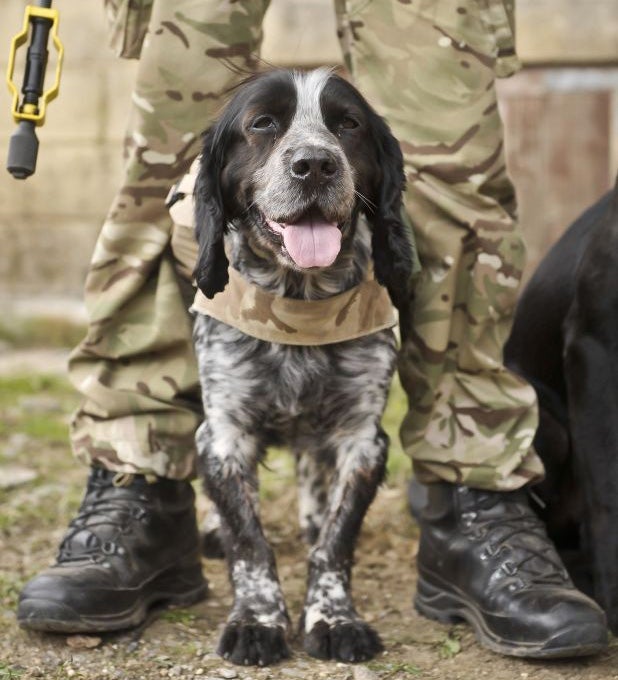350 retired military dogs destroyed since 2009, new figures reveal
42 put down with 'dangerous temperament' while 117 put down for 'age and welfare' reasons

More than 350 retired British military dogs have been destroyed since the start of 2009, figures have shown.
The Ministry of Defence (MoD) confirmed it had put down 42 dogs due to a "dangerous temperament", while 27 developed cancer-related health problems.
The majority (117) were put down due to "age and welfare" reasons, while 76 had osteoarthritis.
Figures obtained by the Press Association show four were killed in action in Afghanistan, while another had to be destroyed due to injuries sustained in a road accident.
A further 419 dogs were rehomed between January 2009 and mid-June this year, the MoD said.
An MoD spokesman said it was reviewing its policy to ensure that a military vet, in conjunction with an experienced dog handler, would be involved with every decision to put a dog to sleep.
It comes as MPs and animal charities have called on military bosses to ensure euthanasia is a last resort for retired dogs, and have asked them to explore other options.
Lib Dem MP Tessa Munt said she was "genuinely shocked by the surprisingly high figures for euthanasia for ex-military animals".
Neil Parish, MP for Tiverton and Honiton and chairman of the Associate Parliamentary Group for Animal Welfare, said: "Dogs employed in our armed services demonstrate commitment to their handlers and bravery on a daily basis and have undoubtedly saved the lives of countless servicemen and women. We have a duty of care for their well-being as real as the military covenant.
"Although I think that most people will understand that it is not always possible to rehome all ex-service dogs, I think it is vitally important that we make sure that none of the 117 dogs that were put down because of 'age and welfare' reasons since 2009 were done so out of expediency and that every effort is made to rehome ex-service animals.
"The Government has stated that there are no time restrictions on a dog being kept while a suitable home is looked for and I hope that the Ministry of Defence bears this in mind."
The Dogs Trust, the UK's largest dog rehoming charity, said it understood most ex-service dogs could not be rehomed as pets, but said it wanted to MoD to investigate other uses for them upon retirement.
A spokesman said: "Deployment to another role or retirement to a specialist handler within the service community are two options explored by the MoD that Dogs Trust would always advocate for healthy dogs. However the charity recognises that for some specific cases rehoming is very sadly not an option.
"Many of the dogs trained by the MoD serve as protection dogs which would make them unsuitable for the average home.
"The Dogs Trust never puts a healthy dog down and is opposed to the premature euthanasia of working dogs when retired or no longer able to perform their duties. We actively encourage specialist rehoming and retirement programmes."
According to the figures, 68 dogs were put down in 2009, 117 in 2010, 84 in 2011, and 71 in 2012, while 30 were put down between January and July this year.
Last month the Sun newspaper revealed two guard dogs used to protect the Duke of Cambridge were put down within days of him leaving his military base at RAF Valley on Anglesey.
A spokesman for David Amess, Conservative MP for Southend West, said: "The recent reports regarding the figures released by the MoD, citing that 71 military working dogs were put down last year, have led many to question the motives behind this policy.
"David has made inquiries to the MoD and the reasons given for this current policy have mostly been based on the medical conditions of each animal when they are discharged from active service, conditions such as blindness, osteoarthritis and old age.
"He hopes that this information will raise awareness of the number of military working dogs being put down, and that more will be done to encourage the rehoming of these brave service dogs that deserve a loving home when they retire from military service."
Wells MP Ms Munt said: "When the MoD invests millions of taxpayers' money on training these animals, it seems unfortunate that their ongoing welfare is not taken nearly as seriously. This is troubling.
"I have always believed that the way people treat animals says a lot about them, and I hope that the release of these figures into the public domain will lead to greater planning and a more compassionate approach in future."
The MoD said "every effort" was made to rehome military working dogs at the end of their service life, although illnesses associated with old age forced some dogs to be destroyed.
A spokesman added: "The MoD has a moral and legal duty to ensure the welfare of our animals and only put down those dogs that cannot be rehomed. We announced in September that we would review our existing policy to ensure that consistency across the MoD.
"Military working dogs play an invaluable role on the front line helping to save the lives of our armed forces and local residents in Afghanistan. Dogs are afforded as much protection as possible and handlers are specifically trained to minimise the risks that dogs face in performing their tasks."
PA
Join our commenting forum
Join thought-provoking conversations, follow other Independent readers and see their replies
Comments